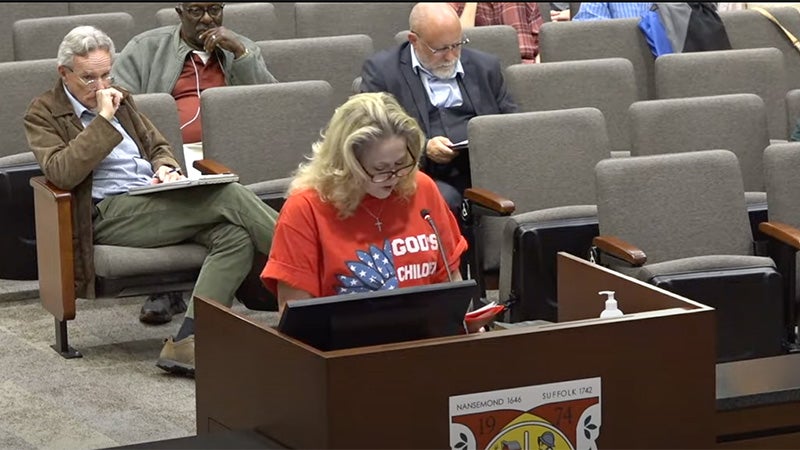SPS School Board walks back stance on prayer, allows prayer during public comment
Published 12:56 pm Thursday, November 16, 2023
|
Getting your Trinity Audio player ready...
|
Just months after shutting down a request to “pray for Suffolk Public Schools” by Suffolk resident Angela Kilgore during the Nov. 10 meeting, the board allowed Kilgore to retake the podium. This time, she was able to pray, according to Kilgore in her remarks, “in lieu of suing the school board.”
In a media release, the president of The Family Foundation and its legal arm, Founding Freedoms Law Center, Victoria Cobb said, “We are pleased that the Suffolk School Board eventually acknowledged that they were wrong to discriminate against Angela Kilgore in denying her the ability to express religious speech. The government doesn’t get to disfavor or disallow religious speech over non-religious speech.”
In the same release, Kilgore also said she was pleased the board decided to allow her the opportunity to pray in her comments.
“I’m glad they got the message and that I had the opportunity to pray,” Kilgore said in the statement. “In my comments, I shared, ‘You were wrong by shutting me down. You know it. I know it and now everyone will know it.’ I decided that I could not stay silent and just go away because the right of free speech including prayer is simply too important.”
A statement from the board said Kilgore was allowed to pray after reviewing recent federal cases regarding First Amendment rights in a limited public forum.
“After further legal review of the request by Mrs. Angela Kilgore and recent federal court cases regarding prayer and the exercise of First Amendment Rights in a limited public forum, it was determined that any impact on the School Board or Suffolk Public Schools would be negligible if she were allowed to pray during the public meeting; therefore, her request to pray was granted,” a spokesperson for the Suffolk Public School Board said.
Back in August, while addressing the board, Kilgore asked to pray for the board and the students of Suffolk Public Schools. As she began, school board Chair Tyron Riddick interrupted and told Kilgore that praying was not allowed, stating, “That is not what you signed up to do, ma’am … We ask that you get back on to your topic. “
Kilgore then responded that the prayer was part of her topic of conversation. Riddick responded, “Well, then it is not permitted at this time.”
Kilgore then invited anyone who wanted to join her in the lobby for a prayer was welcome and left the podium.
As Kilgore was walking away, Riddick said he wanted to clarify.
“I do want to clarify,” he said. I do not object to prayer. I believe we, man, should always pray. I mean, this is not the place per the law.”
Riddick then called on school board attorney Wendel Waller to further explain the board’s position.
However, before Waller could begin, some audience members began to recite The Lord’s Prayer, at which point Riddick called for a recess. Someone with the board can be heard telling Riddick to ask officers to “remove her.” Although it is unclear who this person was explicitly referring to, Riddick asked officers to “clear the room” during the recess.
Before the microphones were silenced, someone else on the board can be heard saying, “I wouldn’t worry about it. They want attention.”
After a brief recess, Riddick again addressed Kilgore’s attempt to pray, saying if one denomination were allowed to pray, the board would have to allow other denominations to pray.
In response, the Founding Freedom Law Center (FFLC) and First Liberty sent a joint letter to the board condemning the policy, saying in part, “ … prohibiting Ms. Kilgore or any other citizen from praying or otherwise expressing their religious perspective during the public comment period in this fashion is unconstitutional religious and viewpoint discrimination.” The full text of the letter can be found here.
In response, Waller said the board created a “limited public forum,” which is a forum where the government limits access to a designated public forum to certain classes or types of speech.
“The School Board has not created a “public forum” — as was the case in Shurtleff [Shurtleff City of Boston, 142 S. Ct. 1583 (2022)] — but a ‘limited public forum,’” Waller wrote. The full text of the board’s response can be found here.
The FFLC followed up with a more than 2,500-word letter, demanding the school board to “cease further constitutional violations” and allow Kilgore to pray during her allotted time.
“On the basis of the foregoing facts and law, it is important that this situation be promptly corrected for Ms. Kilgore,” the letter reads. “Therefore, we demand that, at a minimum, the Suffolk School Board communicate to Ms. Kilgore that she is permitted to use all or part of her designated public comment time to say a brief prayer. Additionally, we strongly urge the Board to issue a formal statement clarifying that it will not violate citizens’ constitutional rights in this manner any further.”







